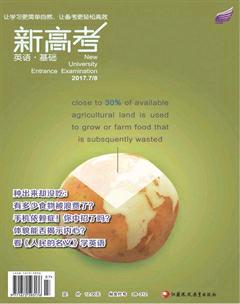介词对比讲解
颜红霞
表示方位的介词:in,to,on
1.in表示在某地的范围之内。例如:Shanghai lies in the east of China.上海位于中国的东部。
2.to表示在某地的范围之外。例如:Japan is/lies to the east of China.日本位于中国的东面。
3.on表示与某地相邻或接壤。例如:Mongolia is/lies on the north of China.蒙古国位于中国北边。
表示计量的介词:at,for,by
1.at表示“以……速度”“以……价格”。
例如:It flies at about 900 kilometers an hour.它以每小时900公里的速度飞行。
I sold my car at a high price.我以高价出售了我的汽车。
2.for表示“用……交换,以……为代价”。
例如:He sold his car for 500 dollars.他以五百美元把车卖了。
注意:at表示单价(price),for表示总钱数。
3.by表示“以……计”,后跟度量单位。
例如:They paid him by the month.他们按月给他报酬。
Here eggs are sold by weight.在这里鸡蛋是按重量卖的。
表示材料的介词:of,from,in
1.of成品仍可看出原料。例如:This box is made of paper.这个盒子是纸做的。
2.from成品已看不出原料。例如:Wine is made from grapes.葡萄酒是葡萄酿成的。
3.in表示用某种材料或语言。
例如:Please fill in the form in pencil first.请先用铅笔填写这个表格。
They talk in English.他们用英语交谈。
表示工具或手段的介词:by,with,on
1.by用某种方式,多用于交通。例如:All supplies are transported by air.补给品全部空运。
2.with表示“用某种工具”。例如:He broke the window with a stone.他用石头把玻璃砸坏了。
注意:with表示用某种工具时,必须用冠词或物主代词。
3.on表示“以……方式”,多用于固定词组。
例如:They talked on the telephone.他们通过电话进行交谈。
She learns English on the radio/on TV.她通过收音机/电视学英语。
表示“关于”的介詞:of,about,on
1.of指“提到或谈到过某人或某事”。
例如:He spoke of the film the other day.他前几天提到这影片。
2.about指“关于某人或某事物的较详细的情况”。
例如:Can you tell me something about yourself?你能告诉我关于你自己的事情吗?
3.on指“关于学术性的或严肃的事”。
例如:It's a textbook on the history of China.它是一本有关中国历史的教科书。
表原因或理由的介词:for,at,from,of,with,by,because of
1.for表示原因,与sorry,famous,punish,praise,thank,blame连用。
例如:Careless campers were blamed for starting the forest fires.引起森林火灾的责任应归咎于粗心大意的野营者。
2.at指情感变化的原因,意为“因听到或看到而……”。
例如:He was surprised at the news.听到这消息他大吃一惊。
3.from指外在的原因,如受伤、车祸等。
例如:Smokers are about twice likely to get the lung infection and die from it,compared with non-smokers.相较而言,吸烟者得肺部感染以及死于肺结核的可能性大约是不吸烟者的两倍。
4.of指内在的原因,如病、饿等。
例如:They were with five families who have watched all their animals die of starvation this year in a deep drought.他们跟五个家庭一块,眼睁睁地看着他们的牛群因为今年的一次旱灾而全部饿死。
5.with指生理上或情感上的由外界到内心的原因。
例如:Hearing the news,he jumped with joy.听到这个消息,他欣喜若狂。
He was shaking with anger.他气得浑身发抖。
6.by表示外部的,尤其是暴力的或无意中造成某种结果的原因。
例如:Her body was bent by age.他因年老背弯了。
She took your umbrella by mistake.她错拿了你的雨伞。endprint
7.because of表示引起结果的直接原因。
例如:He retired last month because ofillness/because he ill.他上个月因为生病退体了。
8.owing to多表示引起某不良后果的原因。
例如:Owing to the rain they could not come.由于下雨他们没来。
9.thanks to表示引起某种幸运结果的原因,常译为“幸亏……,多亏……”。
例如:Thanks to John,we won the game.多亏约翰,我们才赢了这场比赛。
10.out of表示动机的起因,常译为“出于……”。
例如:He asked the question out of curiosity.他出于好奇才问了那个问题。
11.through多表示因局部而影响全局的原因。
例如:The war was lost through bad organization.战争因组织不周而失败了。
表示“好像”或“当作”的介词:like,as
1.like表示“像……一样”。
例如:My experience is very much like that described in the book.我的经历很像这本书上说的那样。
2.as表示“作为,以……身份”;像,如同(用于比较)。
例如:He talked to me as a father.他以父亲的身份跟我谈话。
an old woman with hair as white as snow一位白发如雪的老太太
注:as做连词时,可表示“好像……”。
例如:The work is not so difficult as you imagine.这工作不像你想象得那么困难
表示支持或反对的介词:against,for
against表示“反对”,for表示“支持”,互为反义词。
例如:Are you for my idea or against it?你赞同还是反对我的想法?
表示“除……外”的介词:besides,except,except for,but
1.besides是包括后面所提人或物在内的“除……外,还”。
例如:People choose jobs for other reasons besides money.人們择业除了钱之外还要考虑别的。(金钱原因是考虑在内的。)
He is interested in tennis besides(=as well as)football.他对足球和网球都感兴趣。
2.except是指不包括后面所提人或物在内的“除去”。
例如:Everyone is excited except me.除我以外的每个人都很激动(我并不激动)。
All the visitors are Japanese except him.除他以外的所有游客都是日本人。(他不是日本人)
3.except是排除同类;而except for是排除非同类,常在说明基本情况后从细节上加上修正。
例如:The composition is very good except for a few spelling mistakes.除了几处拼写错误之外,这篇作文整体还是不错的。(作文与拼写错误是非同类的)
4.but与except意思近似,表示“除了……外”经常用在no,all,nobody,anywhere,everything等词和疑问词后面。
例如:I never saw him reading anything but the newspaper.除了报纸,我从来没看过他读过其他的任何东西。
表示“穿过……”的介词:through,across
through表示“从内部通过”;across表示“穿过……”,表示在表面上的通过。
例如:She smiled at him as he walked through the door.他从门口进来时,她朝他笑了。
They ran straight across the road.他们径直跑过了马路。
表示时间的介词:since和from
since表示从过去到现在的一段时间的过程,常与现在完成时连用;from表示从时间的某一点开始,不涉及与现在的关系。一般多与现在时、过去时、将来时连用。
例如:I hope to do morning exercises from today.我希望从今天开始健身。
We have not seen each other since 1995.我们自从1995年后就再也没见过。endprint

